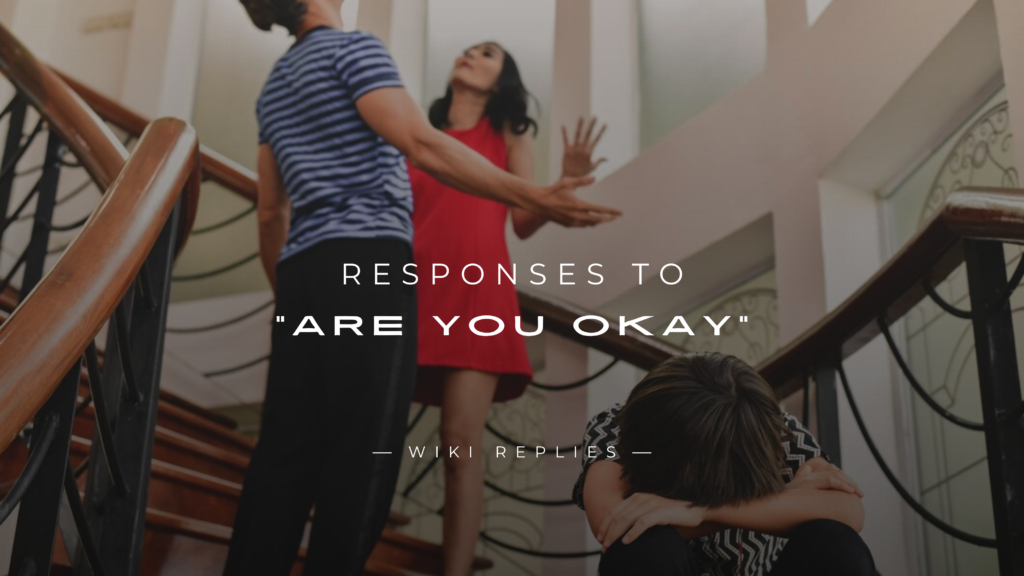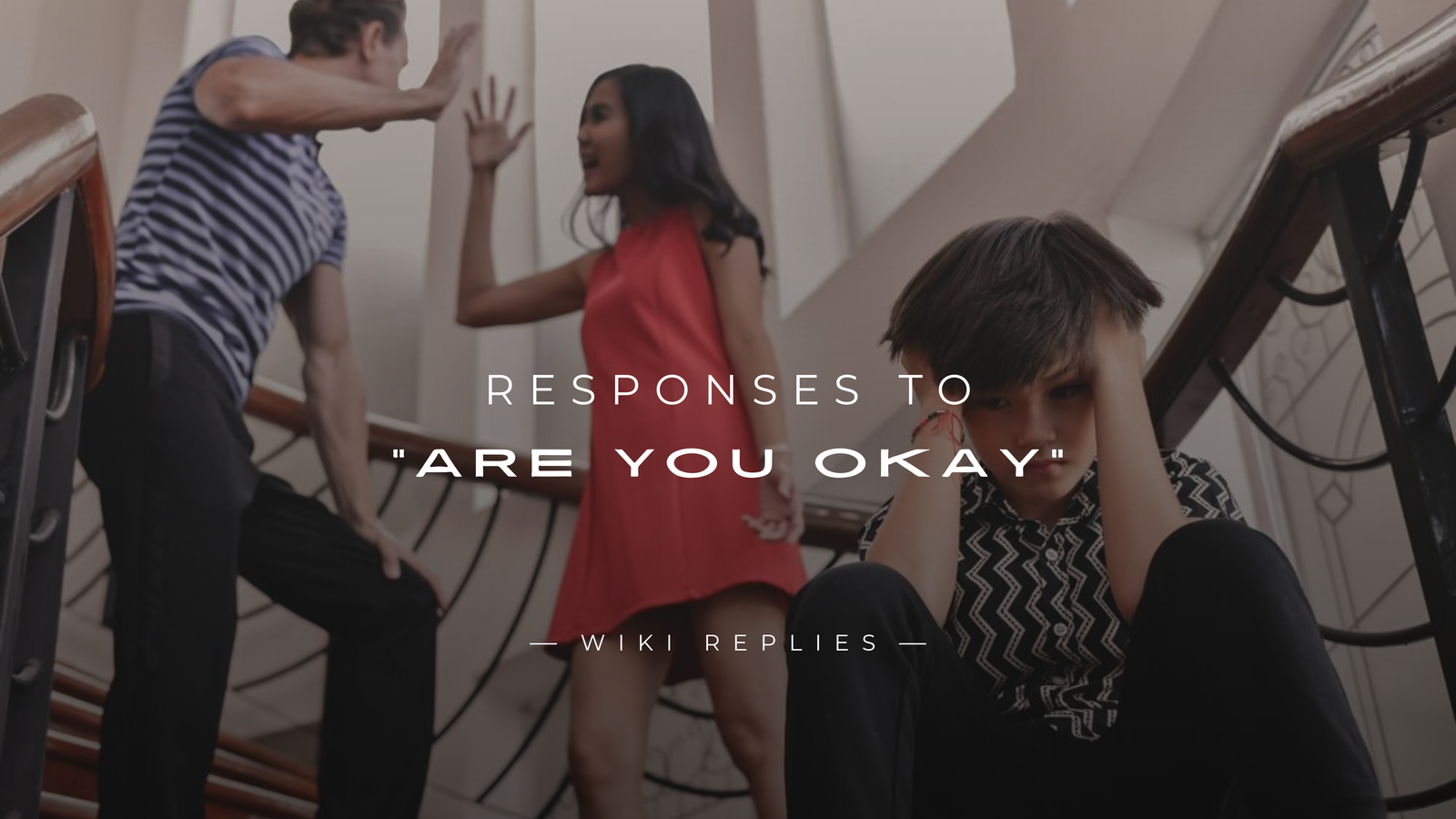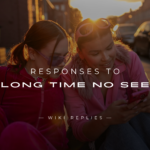We’ve all been there. Someone catches your eye and gently asks, “Are you okay?” Just three words—but wow, do they land heavy sometimes. Depending on your mood, who’s asking, and where you are emotionally, that little question can feel like a floodgate, a hug, or an awkward moment you want to avoid altogether.
Let’s be honest—most of us don’t know how to respond right away. Sometimes we say, “I’m fine,” when we’re anything but. Sometimes we want to spill everything but don’t know where to start.
This article is your guide to navigating those moments with clarity and authenticity. Whether you’re genuinely okay, unsure how you feel, or desperately in need of someone to talk to, you’ll find thoughtful ways to respond. We’ll explore real-world examples, emotional strategies, and boundary-setting tools to help you answer “Are you okay?” in ways that feel true to you.

220+ Responses to “Are You Okay”
Reassuring Affirmation
- Yeah, I’m good, just a little tired.
- Thanks for asking, but I’m totally fine.
- All good here—nothing to worry about.
- I’m okay, promise. Just needed a second.
- Really, I’m fine. Appreciate the check-in.
- I’ve got this, but that means a lot.
- Yep, doing alright. Just taking it slow.
- Thanks, I’m okay now. Was just a moment.
- I’m okay—had a rough patch, but I’m past it.
- Honestly, I’m good. Just needed a breather.
Honest Admission of Struggle
- Not really, but I don’t want to burden anyone.
- I’m trying, but it’s been a lot lately.
- I don’t think I am, to be honest.
- I’m struggling, but I’m managing the best I can.
- I could use someone to talk to, actually.
- I’m not okay, but I will be.
- No, but I’m working on it with help.
- I’ve had better days—this one’s just rough.
- Mentally? No. But I’m here, so that’s something.
- I’m holding on, but it’s been hard.
Deflective Humor
- I’m alive and mostly functional—so, yes?
- Do I look okay? That’s your answer!
- I’m fine… if you ignore everything.
- Define “okay,” and I’ll let you know.
- Emotionally? Somewhere between a raccoon and a Monday.
- Better than a Monday, worse than a Friday.
- Yep! Just cried in the car like a champion.
- I’m okay—on a scale of 1 to chaos.
- Hanging in there like a cat in a poster.
- I’m a solid “meh,” thanks for asking.
Vague but Positive
- I’m managing, thanks for asking.
- I’ve been better, but I’m okay overall.
- It’s one of those “I’ll be fine” kind of days.
- I’m pushing through—it’s not all bad.
- I’m still here, still going.
- I’m doing alright, just taking it slow.
- Things could be worse, I guess.
- Getting through the day, one step at a time.
- It’s a weird day, but I’ll be fine.
- Kind of okay, in a quiet way.
Vague but Negative
- It’s been a long week… and it’s only Tuesday.
- I don’t even know how I feel right now.
- I’ve had easier days, let’s put it that way.
- Not really sure, honestly.
- It’s a bit much lately.
- I’m not great, but I don’t know why.
- I’ve been better. That’s all I can say.
- Everything feels a little off, you know?
- Just feeling kind of “blah” today.
- It’s one of those days where nothing feels right.
Stoic/Minimalist
- I’ll be okay.
- I’m dealing with it.
- It is what it is.
- I’ll survive.
- I’m managing.
- Not great, not terrible.
- Just going through it.
- I’ve been through worse.
- I’ll get through.
- It’s fine.
Enthusiastic Positivity
- Yes! Things are actually going really well.
- I’m great, thanks so much for asking!
- Couldn’t be better, honestly.
- Feeling really good today!
- Life’s been kind lately—no complaints.
- I’m in a great headspace right now.
- Yeah, all is well—thanks for caring.
- Honestly, I feel amazing today.
- Totally okay and feeling optimistic!
- Yep! I’m in a really good place right now.
Cry for Help (Subtle)
- I’m okay… I guess.
- I’ve been better, but it’s nothing, really.
- I’m fine—just tired, that’s all.
- Yeah… just one of those weeks.
- Nothing I can’t handle… I think.
- It’s not a big deal, but thanks for asking.
- I’m surviving.
- I’m getting through it. Slowly.
- I don’t know how to answer that, honestly.
- I’ve got a lot on my mind lately.
Cry for Help (Direct)
- No, I’m not okay. Can we talk?
- Honestly, I’m really struggling.
- I need help. Things aren’t going well.
- I feel overwhelmed and I don’t know what to do.
- I’m not okay at all.
- I don’t know how much more I can take.
- I’ve been trying to hold it together, but it’s too much.
- No. I need someone right now.
- I feel like I’m drowning.
- I can’t pretend I’m okay anymore.
Passive-Aggressive
- Oh, now you care?
- I’ve been better, but I wouldn’t expect you to notice.
- I’m fine, just like I always am when no one checks in.
- Sure, I’m okay—why wouldn’t I be?
- Oh, we’re asking how people feel now? Cute.
- Yeah, everything’s perfect—as always.
- Let me guess, you’re asking because you need something.
- Wow, didn’t expect that question from you.
- I’m okay, just dealing with life… alone, as usual.
- I’m fine. Isn’t that what you want to hear?
Dismissive
- I’m fine. Don’t worry about it.
- It’s nothing. Really.
- I’m good, let’s not make a big deal out of it.
- Doesn’t matter. I’ll deal with it.
- I’m okay. Move on.
- Just drop it, I said I’m fine.
- Yeah, I’m okay. Can we talk about something else?
- I’m handling it. No need to check in.
- It’s whatever.
- I’m good. Let’s not go there.
Confused/Surprised
- Me? Yeah, why do you ask?
- Do I not look okay?
- Wait, what makes you think I’m not?
- That’s random—what made you ask that?
- I wasn’t expecting that question.
- Uh… I think so?
- Yeah? I mean… should I not be?
- You noticed something?
- Now I’m wondering if I’m not.
- Am I giving off weird vibes or something?
Grateful
- Thank you for asking—that means a lot.
- I’m not doing great, but I really appreciate you checking in.
- Just hearing that question helps more than you know.
- It’s been tough, but thank you for noticing.
- Thanks for caring. Seriously.
- You have no idea how much I needed someone to ask that.
- I’m holding up, and I’m grateful you asked.
- I appreciate you being there, really.
- I wasn’t expecting that, but it really means something.
- Thank you. Even just being asked makes me feel seen.
Sarcastic
- Oh, I’m thriving… like a cactus in the desert.
- Totally fine—if “fine” means chaos.
- Yep, just living the dream!
- Oh sure, I’m peachy.
- I’m fabulous—just ask the three voices in my head.
- Couldn’t be worse! But that’s a win, right?
- Yep, everything’s broken—but I’m smiling through it!
- I’m fantastic—emotionally bankrupt, but who isn’t?
- Oh yeah, mental breakdowns are trending now, right?
- Yep. Surviving on coffee and denial!
Avoidant/Changing Topic
- Anyway, how are you doing?
- Let’s not talk about me—what’s going on with you?
- I’m okay… but have you seen the news today?
- That’s sweet of you to ask, but what about you?
- I’m fine—so, what’s new on your end?
- Can we not get into that right now?
- It’s complicated. But how are you feeling?
- That’s not important—tell me about your day.
- We’ll get to me later. You first.
- I’ve been better, but let’s not go there today.
Physically Focused
- Physically? Yeah. Emotionally? Not so much.
- I’m just exhausted—my body’s been dragging.
- I’ve got a headache, but I’ll live.
- My body’s here, my brain is on low battery.
- I didn’t sleep much last night, so I’m kind of out of it.
- I feel run down, honestly.
- My body’s fine, it’s the mental part I’m working on.
- Sore, tired, and in need of a stretch—but I’ll be okay.
- I think I just need food and a nap.
- Physically? I’m functioning. Mentally? Jury’s out.
Existential
- Honestly, I don’t even know what “okay” means anymore.
- Are any of us truly okay?
- In the grand scheme of the universe? Who knows.
- I’m existing… does that count?
- Some days I feel like I’m just floating through life.
- What is okay? A social construct?
- I keep wondering if this is it.
- I wake up, I work, I sleep—repeat. That’s something, right?
- I’m okay in the way a lost astronaut might be.
- Every day feels the same, but I’m still here.
Emotionally Numb
- I don’t feel anything right now.
- I think I’ve shut down emotionally.
- I’m not sad or happy—just kind of… blank.
- I can’t even tell how I feel anymore.
- It’s like I’m watching my life happen from outside myself.
- I guess I’m okay. I don’t know.
- I haven’t felt much of anything for days.
- I’m not crying or anything, I just feel… flat.
- I’m numb. It’s easier that way.
- I don’t even have the energy to feel bad.
Defensive
- Why are you asking?
- I’m fine, okay? Just drop it.
- I said I’m okay—what else do you want?
- What, do I not look okay?
- I don’t need anyone’s help, seriously.
- I can handle it. I don’t need a check-in.
- Don’t worry about me, I’ve got it handled.
- I’m not in the mood to talk about this.
- It’s none of your business.
- I’m dealing with it—leave it at that.
Optimistic Despite Difficulty
- Not great, but I believe things will get better.
- I’ve had a rough time, but I’m hopeful.
- I’m struggling, but I know I’ll come out stronger.
- It’s tough, but I’m trying to stay positive.
- I’ve been better, but I’ve also been worse.
- It’s a challenge, but I’m learning from it.
- Still fighting, but I’m not giving up.
- It hurts, but I’m healing.
- One day at a time—that’s how I’m getting through.
- I’ve got faith it won’t be like this forever.
Indirect/Using Metaphor
- I feel like I’m treading water in a storm.
- I’m a puzzle with some missing pieces.
- I’m walking through fog, but I think I see the sun.
- I’m a little cracked, but still holding together.
- Some days I’m the glass half-full, some days I’m the spill.
- I’m a phone on 1%—just trying to make it to the charger.
- Like a kite in the wind—barely hanging on.
- I’m a duck—calm on the outside, paddling like mad underneath.
- I’m running on fumes, but still moving.
- I’m a book halfway open—some pages good, some messy.
Contextual (Based on Situation)
- Given everything going on, I’m doing alright.
- With all the stress lately, I think I’m holding up okay.
- Considering the week I’ve had, I’m surviving.
- Honestly? After today, I’m just glad to be home.
- In this economy? I’m as okay as one can be.
- With how things are at work, I’m surprised I’m still functioning.
- All things considered, I can’t complain too much.
- It’s been a chaotic month, but I’m still on my feet.
- After the news I got today, I’m a bit shaken, but managing.
- With everything going on in the world, I feel weird saying I’m okay.
Why the Question “Are You Okay” Feels So Intense
“Are you okay” might be the simplest question, but emotionally, it’s a loaded one. It puts your internal state front and center. It can feel supportive, intrusive, or just confusing depending on the situation.
This question often triggers self-reflection. That’s powerful—but it can also be uncomfortable. Especially when you’re caught off guard or unsure how you’re actually doing.
The emotional intensity comes from the fact that it forces a pause. It makes you check in with yourself—and sometimes that’s exactly what you didn’t want to do at that moment.
Understand Who’s Asking and Why
Not every “Are you okay?” is created equal. The intention behind the question matters, and so does your relationship with the person asking.
Is it your best friend, a coworker, or a stranger? Is the tone casual or deeply concerned? These details affect how much you might want to share.
Being aware of their intention helps you choose a response that honors both their concern and your comfort.
Pause and Check in With Yourself First
Before you say anything, take a second. Ask yourself, Am I okay?
Don’t feel like you have to rush an answer. That pause is powerful. It lets you notice your emotions and choose honesty over habit.
Even saying, “I’m not sure,” is a real answer. You don’t need clarity to respond; you just need a moment of self-awareness.
Try Naming What You Feel
Labeling your emotion—even vaguely—can make it easier to respond.
- “I’m exhausted.”
- “I feel off, but I don’t know why.”
- “Honestly, I’m anxious today.”
Even that little bit of clarity makes a big difference when you’re trying to answer truthfully.
How to Respond When You Actually Feel Okay
Sometimes, you’re doing just fine—and that’s great! Let the person know with a calm, reassuring tone.
Examples:
- “Yeah, I’m doing good. Thanks for asking.”
- “I’m actually feeling great today, appreciate the check-in!”
- “All’s well on my end. Just a little tired, that’s all.”
A friendly, light response shows appreciation for their care while keeping it casual.
How to Respond When You’re Not Okay but Don’t Want to Talk
You’re allowed to not want to open up. Maybe you’re not in the right space, or maybe it’s not the right person.
Here are respectful yet protective ways to respond:
- “Not really, but I don’t want to get into it right now.”
- “It’s been a tough day, but I appreciate you asking.”
- “I’m going through some stuff, but I’d rather not talk about it.”
This way, you’re being honest without over-sharing or making yourself uncomfortable.
How to Respond When You’re Not Okay and Need Support
When you’re ready to talk, and you need someone, say so. That moment can be the opening to real connection.
Try:
- “Honestly, I’m not okay. Could we talk?”
- “I’m dealing with a lot right now, and I could really use someone to listen.”
- “Thanks for asking. I’ve been struggling, and it helps just knowing you care.”
It takes courage, but letting someone in can be the first step toward healing.
Tailor Your Response Based on the Relationship
If It’s a Close Friend or Family Member
Feel free to be vulnerable here. They’re probably asking because they genuinely want to support you.
Examples:
- “I’ve had a hard week. I could really use some advice.”
- “I’m not okay, and I’d really love to talk when you have a moment.”
If It’s a Coworker or Acquaintance
Keep it simple and professional, while still acknowledging your reality.
Examples:
- “Thanks for asking. It’s been a rough few days, but I’m hanging in there.”
- “I’m okay, just dealing with a little stress.”
If It’s a Stranger
Acknowledge their kindness without going deep.
- “Thanks for asking. I’m alright.”
- “Appreciate you checking in. Just a little off today, but I’ll be fine.”
Setting Healthy Boundaries When You Don’t Want to Share
You don’t owe anyone your full emotional story. If someone asks “Are you okay” and you don’t feel safe or ready to answer, that’s completely valid.
Here are ways to set a clear, respectful boundary:
- “I’m working through some stuff, but I’m not up for talking about it right now.”
- “I appreciate your concern. I just need a little space to sort things out.”
- “Thank you, but I’d rather not discuss it.”
You’re allowed to protect your peace.
When Humor Helps You Cope
Sometimes a bit of humor lightens the mood—especially if it’s your coping style.
Examples:
- “I’m functioning purely on caffeine and hope. So… yeah.”
- “Let’s just say today’s been a rollercoaster, and I forgot my seatbelt.”
Humor can ease tension and make vulnerability feel less scary. Just be mindful that you’re not using it to totally deflect from emotions that need attention.
What Not to Do When Responding
- Don’t Default to “I’m Fine” When You’re Not
It’s easy, but it shuts the door on real connection. If someone took the time to ask, it’s okay to be a little more honest.
Even “I’ve been better” is a step up from pretending.
- Don’t Ghost or Ignore the Question
Silence can feel like a rejection. If you don’t want to talk, say so gently. A simple, “I’m not ready to talk about it, but thank you for asking,” goes a long way.
Texting vs. Talking: Different Dynamics
Over Text
Texting gives you more time to think, but can lack emotional depth. Be clear and sincere.
Examples:
- “I’ve had a rough day, but I appreciate you reaching out.”
- “Not okay at the moment, but thank you. It means a lot.”
In Person or on a Call
Face-to-face or voice chats give you tone and nuance. If you’re opening up, this is often the better space for deeper conversations.
- “Can I be honest with you? I’ve been really struggling lately.”
When “Are You Okay” Triggers Anxiety
For some, this question brings up anxiety. You might feel exposed or like you’re being put on the spot.
Here’s what helps:
- Take a breath before responding.
- Know that you can say, “I’m not sure how to answer that right now.”
- Remind yourself that they’re asking out of care, not criticism.
You’re not being interrogated—you’re being checked on.
If You Get Asked Too Often
Sometimes when people notice you’re not okay, they keep checking in. While it’s coming from love, it can feel overwhelming.
You can kindly say:
- “Thank you for caring. I promise I’ll reach out when I’m ready.”
- “It means a lot that you ask, but I just need some space to process things right now.”
Setting emotional boundaries is healthy—and it doesn’t mean you’re pushing people away.
Turn It Around: Ask Them If They’re Okay Too
Don’t forget, the person asking may also be struggling in their own way. When the moment feels right, flip the script.
- “Thanks for asking. How are you doing?”
- “I’ve been a bit off—how about you?”
Emotional check-ins can go both ways. Mutual vulnerability builds deeper connections.
Conclusion
No matter the situation, having the right words ready when someone asks, “Are you okay?” can make all the difference in your response—whether you want to be honest, lighthearted, or simply polite. These 220+ responses give you a wide range of options to express yourself authentically and thoughtfully. If you’re also looking for the perfect way to reply to condolences, be sure to check out our guide on 220+ Best Responses to “Sorry For Your Loss” Messages for compassionate and meaningful replies.
FAQs
Q. What if I really don’t know how I feel when someone asks “Are you okay”?
That’s okay. Say, “I’m not sure, but I appreciate you asking.” You don’t have to figure it all out to respond honestly.
Q. Is it okay to not want to talk about my feelings when asked “Are you okay”?
Absolutely. You’re not obligated to open up. Try saying, “I’m not up for talking right now, but thank you.”
Q. Can humor be a valid response?
Yes—but be mindful. Humor can ease discomfort, but don’t use it to always hide real feelings.
Q. How can I respond politely when I’m overwhelmed by too many check-ins?
You can say, “Thanks so much for checking in—right now, I just need a little space, but I appreciate you.”
Q. Is it okay to ask someone else if they’re okay even if I’m not okay myself?
Definitely. You don’t have to be perfect to care about others. In fact, sharing your struggles can create deeper connections for both of you.










